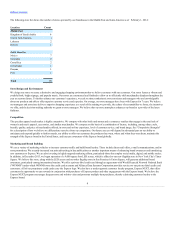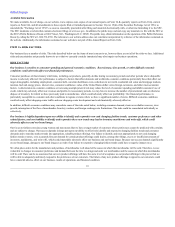Express 2013 Annual Report Download - page 16
Download and view the complete annual report
Please find page 16 of the 2013 Express annual report below. You can navigate through the pages in the report by either clicking on the pages listed below, or by using the keyword search tool below to find specific information within the annual report.
Table of Contents
cards. We also rely on a third party to administer certain aspects of our payroll. If any of these third parties fails to perform their obligations to us or declines
to provide services to us in the future, we may suffer a disruption to our business. Furthermore, we may be unable to provide these services or implement
substitute arrangements on a timely and cost-effective basis on terms favorable to us.
There are claims made against us from time to time that can result in litigation or regulatory proceedings which could distract management from
our business activities and result in significant liability.
We face the risk of litigation and other claims against us. Litigation and other claims arise in the ordinary course of our business and include commercial
disputes, intellectual property issues, consumer protection and privacy matters, product-oriented allegations, employee claims, and premise liability claims. In
2013, Express, LLC received notice of a potential claim alleging improper collection of zip codes in violation of Massachusetts law. See Note 14 to our
Consolidated Financial Statements included in "Item 8. Financial Statements and Supplementary Data" in Part II of this Annual Report on Form 10-K. Any
claims could result in litigation against us and could also result in regulatory proceedings being brought against us by various federal and state agencies that
regulate our business, including the United States Equal Employment Opportunity Commission. Often these cases raise complex factual and legal issues,
which are subject to risks and uncertainties and which could require significant management time. Litigation and other claims and regulatory proceedings
against us could result in unexpected expenses and liability, and could also materially adversely affect our operations and our reputation.
In addition, we may be subject to liability if we infringe the trademarks or other intellectual property rights of third parties. If we were to be found liable for
any such infringement, we could be required to pay substantial damages and could be subject to injunctions preventing further infringement. Such
infringement claims could harm our brand image and any payments we are required to make and any injunctions we are required to comply with as a result of
such infringement actions could adversely affect our financial results.
Changes in laws, including employment laws and laws related to our merchandise, could make conducting our business more expensive or
otherwise change the way we do business.
We are subject to numerous regulations, including labor and employment, product safety, customs, consumer protection, privacy, and zoning and occupancy
laws and ordinances that regulate retailers generally and/or govern the importation, promotion, and sale of merchandise, and the operation of stores and
warehouse facilities. If these regulations were to change or were violated by our management, employees, vendors, or buying agents, the costs of certain goods
could increase, or we could experience delays in shipments of our goods, be subject to fines or penalties, or suffer reputational harm, which could reduce
demand for our merchandise and hurt our business and results of operations.
In addition to increased regulatory compliance requirements, changes in laws could make ordinary conduct of our business more expensive or require us to
change the way we do business. For example, changes in federal and state minimum wage laws could raise the wage requirements for certain of our employees.
Other laws related to employee benefits and treatment of employees, including laws related to limitations on employee hours, supervisory status, leaves of
absence, mandated health benefits, or overtime pay, could also negatively impact us, such as by increasing compensation and benefits costs for overtime and
medical expenses.
Moreover, changes in product safety or other consumer protection laws or environmental laws could lead to increased costs to us for certain merchandise or
additional costs associated with readying merchandise for sale. It is often difficult for us to plan and prepare for potential changes to applicable laws and
future actions or payments related to such changes could be material to us.
We may be unable to protect our trademarks or other intellectual property rights and may be precluded from using trademarks in certain
countries, which could harm our business.
We rely on certain trademark registrations and common law trademark rights to protect the distinctiveness of our brand. However, there can be no assurance
that the actions we have taken to establish and protect our trademarks will be adequate to prevent imitation of our trademarks by others or to prevent others
from claiming that sales of our products infringe, dilute, or otherwise violate third-party trademarks or other proprietary rights that could block sales of our
products.
The laws of certain foreign countries may not protect the use of unregistered trademarks to the same extent as do the laws of the United States. As a result,
international protection of our brand image may be limited, and our right to use our trademarks outside the United States could be impaired. Other persons or
entities may have rights to trademarks that contain portions of our marks or may have registered similar or competing marks for apparel and/or accessories in
foreign countries. There may also be other prior registrations of trademarks identical or similar to our trademarks in other foreign countries. Accordingly, it
may be possible for others to prevent the sale or manufacture of our branded goods in certain foreign countries. Our inability to
16
























